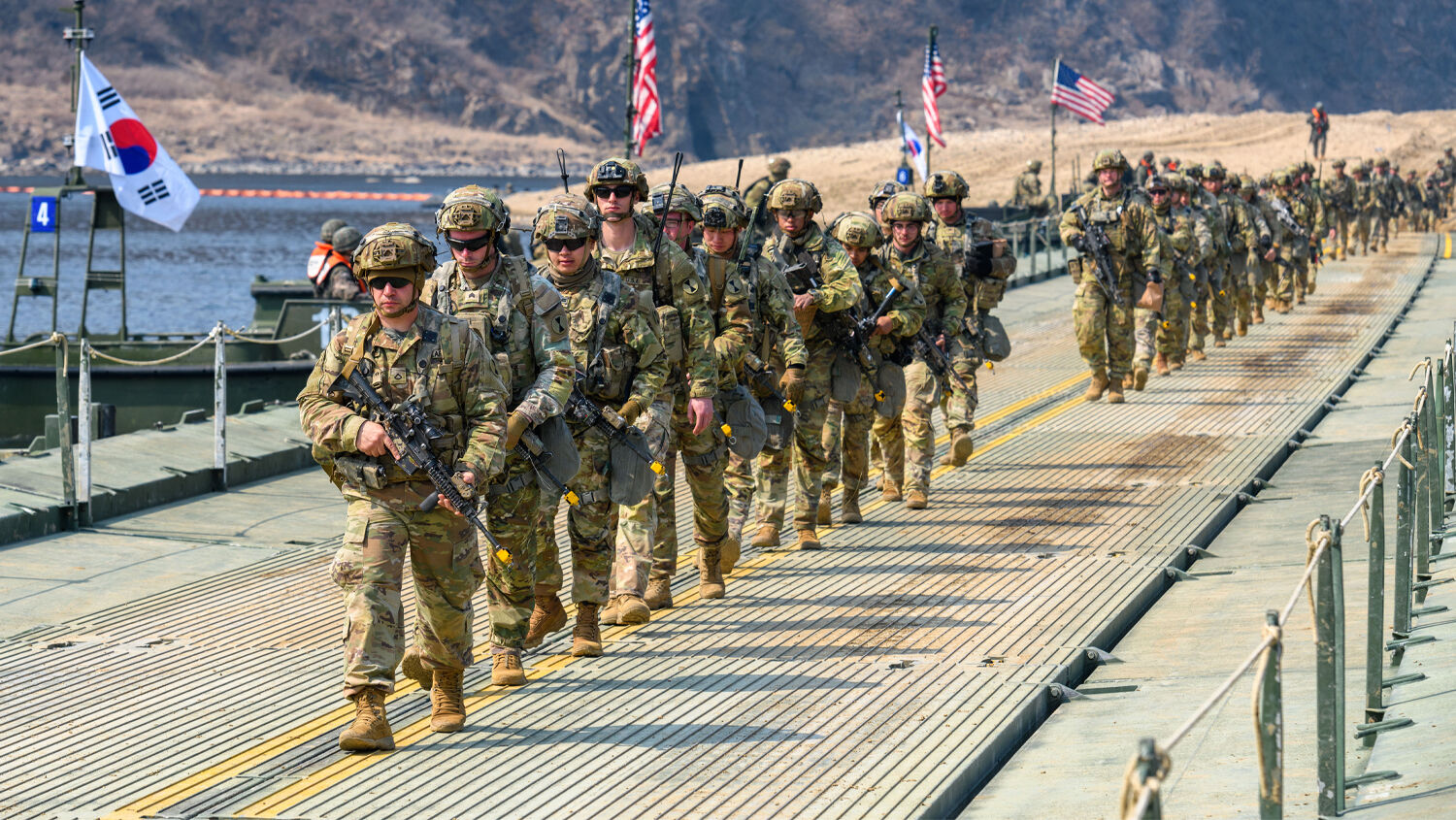
America Weighs Pulling Thousands of Troops Out of South Korea
The Trump administration is considering withdrawing thousands of United States troops from South Korea, the Wall Street Journal reported Thursday. The move would be welcome news to Russia, China and North Korea and stir new fears about America’s commitments to longtime allies.
The proposal calls for pulling 4,500 of the current 28,500 U.S. troops out of the country and possibly moving them to other locations in the region, such as Guam.
Last month, U.S. military planners cautioned that such a drawdown would undermine America’s and South Korea’s performance against North Korea in the event of war, as well as in potential conflicts with Russia and China. “Inherently, it would reduce our ability to prevail in conflict,” Adm. Samuel Paparo said during an April 10 Senate Armed Services Committee hearing.
U.S. forces in South Korea “are critical to helping Indo-Pacific Command see, sense and understand threats to the north and to deter a great many adversaries,” Army Gen. Xavier Brunson, commander of U.S. Forces Korea, said the next day. “They are a critical component to ballistic missile defense in the region,” he said. “To reduce the force becomes problematic.”
Since President Donald Trump has long questioned the value of the U.S.-South Korea alliance to America, and since many South Koreans seek greater militarily independence, there is speculation that this withdrawal could be a major step toward ending the alliance.
This prospect is worrying in light of all that is at stake for Asia—and the world.
For more than seven decades, this alliance has stood as a pillar in America’s strategy to stabilize Asia, keep its shipping lanes open, and keep the region’s aggressors from running roughshod over it. A full split would see the remaining thousands of U.S. troops in South Korea ousted and almost certainly bring an end to the Terminal High Altitude Area Defense (thaad) system that America operates on the peninsula. These developments would shift a hefty amount of political and military influence away from the U.S. and toward Asia’s regional behemoths. They would give North Korea a freer hand and give far more power to China and Russia in their drive to assert their will in East Asia and beyond.
The Trumpet has long predicted that such a shift, reducing America’s power in the Orient and ending its alliances, will take place. “The scenario of an America-free Asia will not remain hypothetical for much longer,” we wrote in January 2014. “We can already see tectonic geopolitical shifts that are rapidly turning it into a reality.”
For decades, the Trumpet and its predecessor, the Plain Truth, have maintained this same forecast. Now a growing number of trends—such as the possibility of a rupture in the U.S.-South Korea alliance—shows how quickly it could happen. Bible prophecy says it will occur in the near future, just before a third world war.
In the 1930s, Herbert W. Armstrong began warning that U.S. power and influence would eventually disintegrate. Following America’s failed efforts to invade Cuba in 1961, he blamed, not the American military or the Kennedy administration, but the people of the country: “Unless or until the United States as a whole repents and returns to what has become a hollow slogan on its dollars: ‘In God we trust,’ the United States of America has won its last war! [T]he God America has deserted gave it its most humiliating defeat! What does the Cuban debacle mean? It means, Mr. and Mrs. United States, that the handwriting is on your wall!” (Plain Truth, October 1961).
Mr. Armstrong understood that U.S. power would decline. He knew it would occur because of his understanding of Bible prophecy, which makes specific forecasts about the descendants of ancient Israel, which includes the Americans. (This can be proved by reading our free book The United States and Britain in Prophecy.) In Leviticus 26:19, God warned the people of Israel that if they rejected His law, He would “break the pride” of their power.
Since Mr. Armstrong’s death in 1986, the people of America have intensified their rejection of God and His law. At the same time, the U.S. has entered into numerous military conflicts, each one sapping a little more of the country’s pride in its power.
The tensions in the U.S.-South Korea alliance today show that more people around the globe are coming to see that America’s pride in its power is broken.
Meanwhile, Revelation 16:12 discusses a group of nations called “the kings of the east” that will come together in the end time, just as America is declining. Revelation 16, Ezekiel 38 and other Bible passages show that this Asian bloc will play a major role in the final global war. Ezekiel 38 shows that this bloc will be comprised of Asian nations led by Russia and, to a lesser degree, China.
Revelation 9:16 shows that the combined militaries of these Asian “kings” will number 200 million soldiers—a military force many times larger than any in history. Ezekiel 38:6 lists as part of this Asian alliance some ancient names indicating the modern people of Korea. This shows that whether the Koreas reunite or not, the peninsula will eventually give its military power to the colossal bloc led by Russia and China.
To understand where these trends are leading and the beautiful hope that is tied to them, order our free booklet Russia and China in Prophecy.
